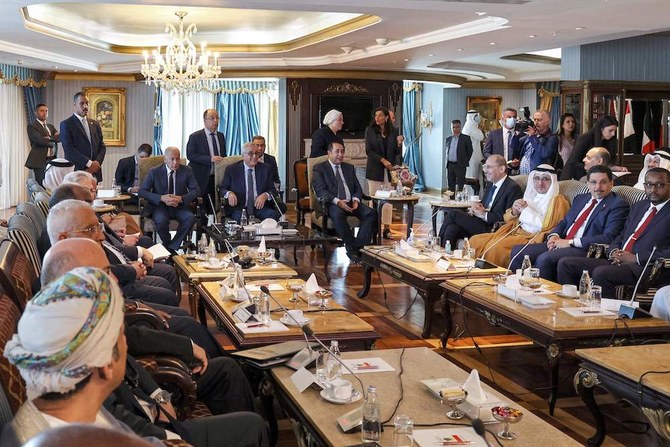BEIRUT: Arab foreign ministers on Saturday pledged their support for Lebanon’s IMF negotiations and reform process, following an Arab League meeting held in Beirut.
They said their presence in Lebanon amid its “significantly difficult” economic and political circumstances signaled that Arab countries supported stability and stood by the country’s negotiations with the IMF and the reform process.
Arab League secretary-general Ahmed Aboul Gheit said: “We came to say that there’s a problem and you must seek to resolve it.”
He told a press conference that the meeting had discussed the preparations, timing, and attendees of the upcoming Arab League summit.
“We just held some discussions and exchanged views to be decided upon in the appropriate place. We also went over the Ukrainian war, food, energy, and the topic of Somalia, where millions of Somalis might be at risk of starvation.
“We also discussed the Palestinian cause amid the American-Israeli moves and how we react to these events. We did not agree on anything because they are mere discussions that we will not reveal.
“Everyone supports ending the pressure of Syrian refugees. The Lebanese state provides them with care but, when decisions similar to agreeing on their return to their country are taken, some specific circumstances should be present.”
He said there was a civil war going on in Syria and “huge” destruction.
“At least $500 million is needed to rehabilitate the Syrian infrastructure,” he added. “These are very complex issues that cannot be resolved with a simple decision. But the international community has the will to end the Syrian war and is still exerting pressure when it comes to the matter of refugees in Lebanon, Jordan, and other countries.”
Lebanon, which was represented by caretaker Foreign Affairs Minister Abdallah Bou Habib, chaired the ministerial meeting.
Algeria will host the Arab League summit in early November after it was postponed in 2020 and 2021 due to COVID-19 lockdowns.
Saturday’s meeting was attended by the foreign ministers of Kuwait, Yemen, Jordan, Qatar, Tunisia, Algeria, the Comoro Islands, Sudan, Somalia, Palestine, the deputy foreign minister of Egypt, and the league’s permanent representatives from Saudi Arabia, the UAE, Djibouti, Iraq, Morocco, Oman, Libya, a representative from Mauritania, and the Bahraini ambassador to Syria.
The Arab ministerial delegation met Lebanese President Michel Aoun, who expressed the importance of regional relations in the “critical circumstances the Arab world is going through, the challenges it is facing, and that requires the utmost consultation and cooperation.”
He talked about the crises facing Lebanon and the burden of Syrian refugees in the country which, he said, was “no longer capable of handling this reality.”
“We seek to reach an agreement with the IMF. There’s an American mediation to demarcate the southern maritime borders of Lebanon,” he said, adding that Lebanon retained its water, oil, and gas resources.
Responding to media questions about revoking the suspension of Syria’s Arab League membership, Algerian Foreign Minister Ramtane Lamamra said: “We didn’t support its membership suspension because Syria is a founding member of the league. The Syrian foreign minister will visit Algeria and we will go over this point with a high sense of responsibility.”
The Arab ministerial delegation also met Lebanese Parliament Speaker Nabih Berri, who said Lebanon was now requesting that its “Arab brothers come and get to the core of its suffering.”
He told his guests that the indirect negotiations between Lebanon and Israel, with US mediation, to demarcate the maritime borders in preparation for gas extraction were advancing.
Prime Minister-designate Najib Mikati met the delegations on Friday night.
He reiterated Lebanon’s commitment to implementing all the resolutions from the UN Security Council and the Arab League in a way that reinforced the dissociation policy toward any Arab dispute, extending the state’s sovereignty over all its territory, and preventing offense to any Arab state and threats to its security.
Aboul Gheit received a political letter from the Sovereign Front for Lebanon opposing Hezbollah and Iran’s role in Lebanon.
The letter demanded “the activation of Lebanon’s right to be free from the Iranian dominance that uses Lebanon and its territories as a platform to conduct hostilities, putting the country in danger and exposing it to attacks from all sides.”
It highlighted “the persistence of illegal weaponry represented by Hezbollah’s organized armed militia, which receives support, orders, and funding from Iran.”
















